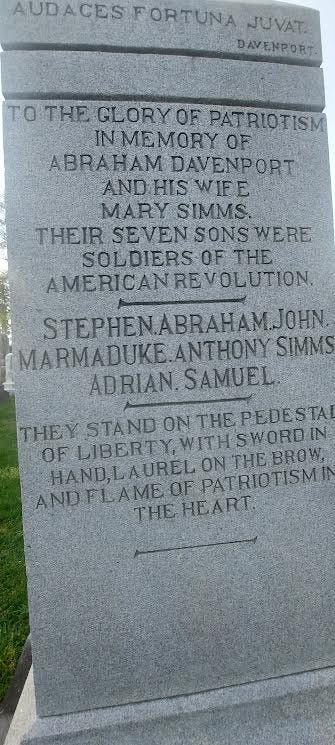King George vs. the Davenports -- a Memorial Day tale of royalty and revenge
The Davenport family contributed seven sons (and their father) to the Revolution
Abraham Davenport came to America as a convict. But if he hadn’t escaped the hangman’s noose, it’s certain that I wouldn’t be here today.
Davenport (1714-89) was convicted of stealing a silver mug in London on Dec. 7, 1737 (a date which will live in infamy in family history). British justice being the ruthless institution at that time, he was sentenced to death.
Death. For stealing a lousy tankard. He claimed he didn’t do it, and he was a victim of perjury.
I’m not sure if this was a case of Dishonest Abe or not. But Davenport and his sons would get vengeance decades later.
A monument to the Davenport family stands in Edge Hill Cemetery in Charles Town, West Virginia. (Photo by John Naughton.)
Davenport was spared his life after a trial in London’s famous Old Bailey. Instead of capital punishment, Davenport was sentenced to transportation to the Colonies. As an indentured servant, he was required to work for his freedom. (To clarify, he was never an enslaved person, but he had to pay off his debt to avoid the noose.)
Abraham was my great, great, great, great, great grandfather. So you could say I’m the descendant of a thief (as well as Pilgrims, Irish railroad workers and Native Americans).
Davenport ended up doing quite well. He worked on a tobacco farm in Maryland, eventually becoming free and marrying Mary Semmes (or Simms). Abe moved to northern Virginia (now Charles Town, West Virginia) and operated his own farm and built a house that still stands.
The cenotaph monument in the cemetery bears the names of seven brothers who all served in the American Revolution. (Photo by John Naughton.)
When the Colonies rebelled against King George III, Abraham’s sons volunteered for military service in Maryland and Virginia.
Keep reading with a 7-day free trial
Subscribe to My Life, in Color to keep reading this post and get 7 days of free access to the full post archives.





